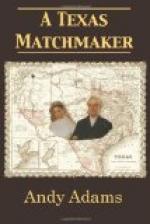As this would be the first trail herd from Las Palomas, we naturally felt no small pride in the transaction. According to contract, everything was to be ready for final delivery on the twenty-fifth of March. The contractors, Camp & Dupree, of Fort Worth, Texas, were to send their foreman two weeks in advance to receive, classify, and pass upon the cattle and saddle stock. They were exacting in their demands, yet humane and reasonable. In making up the herd no cattle were to be corralled at night, and no animal would be received which had been roped. The saddle horses were to be treated likewise. These conditions would put into the saddle every available man on the ranch as well as on the ranchitas. But we looked eagerly forward to the putting up of the herd. Letters were written and dispatched to a dozen ranches within striking distance, inviting them to turn in two-year-old steers at the full contract price. June Deweese was sent out to buy fifty saddle horses, which would fill the required standard, “fourteen hands or better, serviceable and gentle broken.” I was dispatched to Santa Maria, to invite Don Mateo Gonzales to participate in the contract. The range of every saddle horse on the ranch was located, so that we could gather them, when wanted, in a day. Less than a month’s time now remained before the delivery day, though we did not expect to go into camp for actual gathering until the arrival of the trail foreman.
In going and returning from San Antonio my employer had traveled by stage. As it happened, the driver of the up-stage out of Oakville was Jack Martin, the son-in-law of Mrs. McLeod. He and Uncle Lance being acquainted, the old ranchero’s matchmaking instincts had, during the day’s travel, again forged to the front. By roundabout inquiries he had elicited the information that Mrs. McLeod had, immediately after the holidays, taken Esther to San Antonio and placed her in school. By innocent artful suggestions of his interest in the welfare of the family, he learned the name of the private school of which Esther was a pupil. Furthermore, he cultivated the good will of the driver in various ways over good cigars, and at parting assured him on returning he would take the stage so as to have the pleasure of his company on the return trip—the highest compliment that could be paid a stage-driver.
From several sources I had learned that Esther had left the ranch for the city, but on Uncle Lance’s return I got the full particulars. As a neighboring ranchman, and bearing self-invented messages from the family, he had the assurance to call at the school. His honest countenance was a passport anywhere, and he not only saw Esther but prevailed on her teachers to give the girl, some time during his visit in the city, a half holiday. The interest he manifested in the girl won his request, and the two had spent an afternoon visiting the parks and other points of interest. It is needless to add that he made hay in my behalf during this half holiday. But the most encouraging fact that he unearthed was that Esther was disgusted with her school life and was homesick. She had declared that if she ever got away from school, no power on earth could force her back again.




